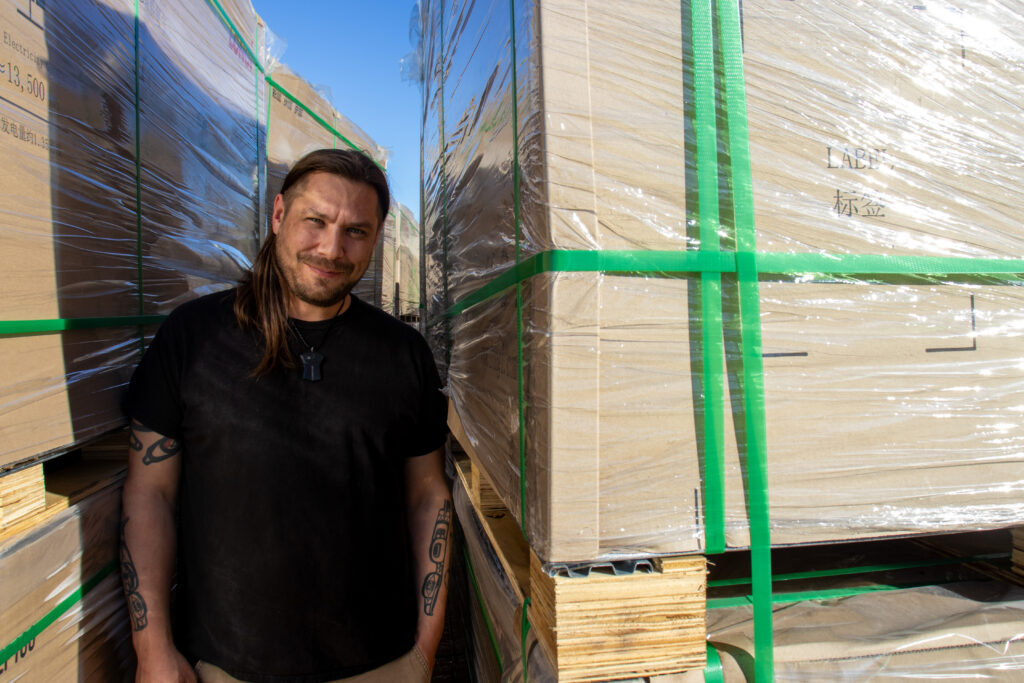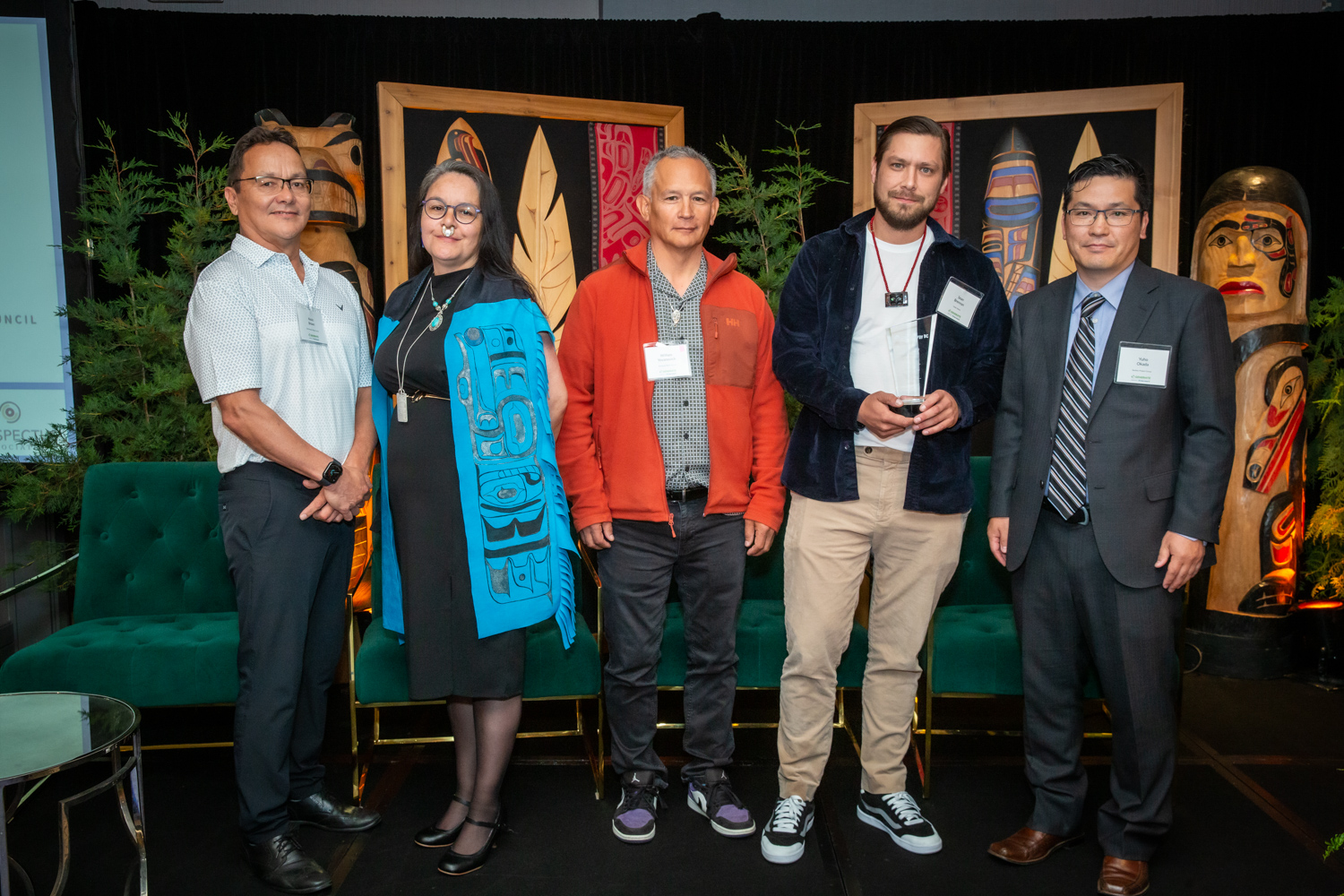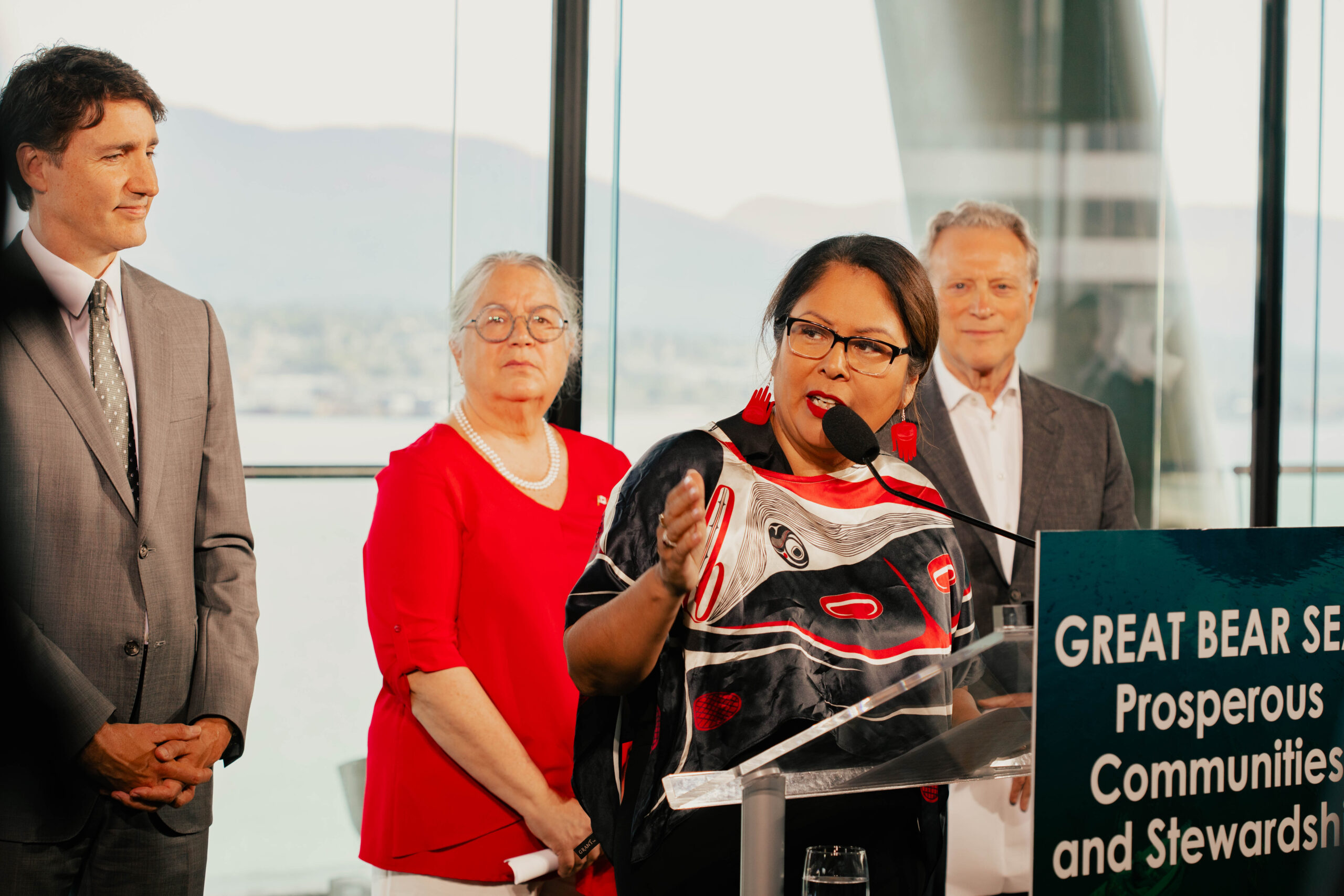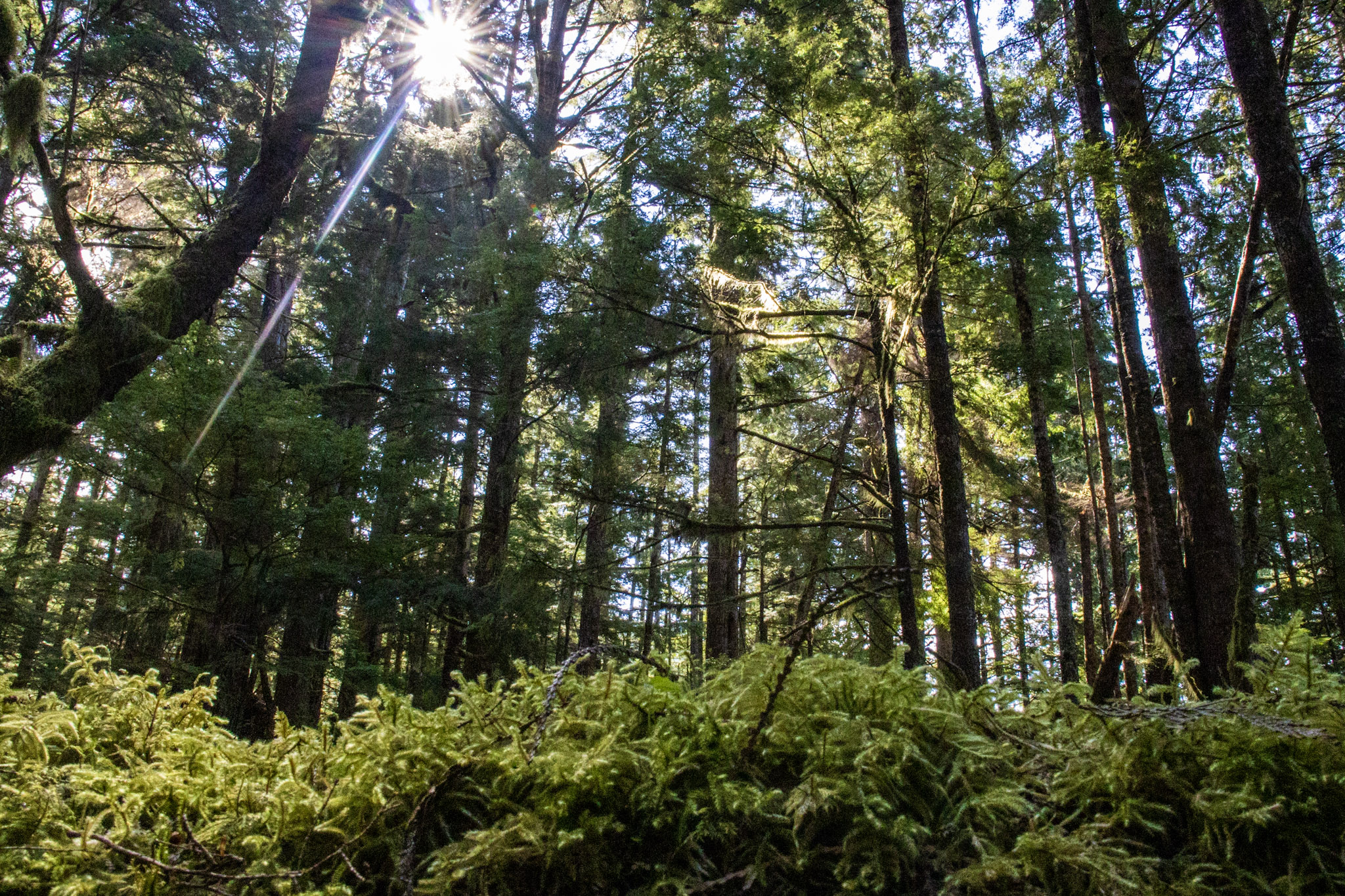Tll Yahda Energy (TYE) — composed of the Old Massett Village Council, the Skidegate Band Council and the Council of the Haida Nation — received the “Community of the Year” award at the 2023 Clean Energy BC conference in Vancouver for their collaborative efforts to get off diesel on Haida Gwaii.
“This award recognizes excellence by a community engaged in the development of clean energy in BC. The award acknowledges excellence in all aspects of community engagement, including education, awareness and involvement in clean energy projects,” said Yuho Okada, Board Chair of Clean Energy BC, as TYE board members and support staff Guuds Gid T’awn Kevin Brown, Kwaa Tsaaps Patrika McEvoy, Ganaay Billy Yovanovich and Nang Hl K’aayaas Sean Brennan joined him on stage.
The path to clean energy on Haida Gwaii has been a long one, according to members of TYE, who attended the three-day clean energy conference along with other First Nations, industry professionals, project developers, operators, academics and policy designers.
Getting Off Diesel for Good
One of the more recent clean energy projects on Haida Gwaii is a two-megawatt solar-farm project, currently in the final stages of installation at the Masset airport on the north end. The project, a $8.5-million build, is expected to reduce diesel usage by about 8.5 percent on the northern grid, reducing carbon by 1,750 tonnes per year and diesel by about 670,000 litres per year, says Nang Hl K’aayaas Sean Brennan, the implementation manager for TYE.
“Historically, we were never really consulted on what types of energy would be possible or what we would like to see on Haida Gwaii and that’s resulted in us being one of the dirtiest energy producers in all of Canada,” he says. “Our people have wanted to change that for a long time. We’ve been in discussion about different types of renewable energies for over two decades now.”
Brennan says the solar farm is one step towards realizing TYE’s mandate — to reduce diesel emissions by 100 percent by 2030.
“If our goals are achieved, BC would be on track to achieve their goal of reducing emissions by 40 percent by 2030 and BC Hydro would achieve 51% of its goal of 71 percent emission reduction in the non-integrated area by 2030,” Brennan says. “If we get to 100 percent off diesel on Haida Gwaii, we would reduce diesel emissions in BC by about 51 percent.”
To achieve the significant goal of getting off diesel for good, Brennan says the Board is taking a focused approach, with “a revised Community Energy Plan that all revolve around “taking what the community wants and making it a reality.”
Ganaay Billy Yovanovich, Chief Councillor of the Skidegate Band Council, says they have been working on cleaner energy initiatives across the island for a long time.
“It’s just the first phase of many more phases to get to 100 percent renewable,” he says. “Getting into this, we knew solar wouldn’t be the only solution to all our energy demands, but we had to establish relationships with BC Hydro and other funders. We have that now. To do all of Haida Gwaii is doable in our lifetime, we’re going to see that.”
What makes the solar farm a success, Yovanovich says, is “all Haida entities working together.”

One Hundred Percent Haida-owned
Yovanovich says the solar farm project is Haida-owned, which he adds, isn’t always the case with energy projects with First Nations.
“Really do your homework on the project and not jump at the first deal thrown around. When you’re doing these projects in your own territory, you can set the bar,” he says. “Everyone wants to help you… but at a cost. Nothing should move without your OK, whatever you work that deal out to, even if you have to finance portions, or the whole project, you can still maintain 100 percent.”
Yovanovich says the solar farm was built because enough people wanted to “do the right thing, reduce diesel consumption, do our part.”
Kwaa Tsaaps Patrika McEvoy, elected councillor for the Old Massett Village Council and board member on TYE played a big role in ensuring energy sovereignty. She has been with the energy board since before it incorporated and worked hard to ensure appropriate management of “anything that happens on Haida Gwaii, with the resources we own and operate,” she says.
“My goal would be for us to be our own Haida energy power authority, so that we don’t have to ask anyone for permission. Whatever we do on Haida lands and waters, with our resources, we’re all making those decisions and not having to ask anyone else for permission to do that.”
McEvoy says renewable energy solutions align with Haida values and are a solution to the increasing impacts of a warming climate.
“We’ve worked hard to ensure we don’t support any oil and gas industries. We’ve worked very hard as a Nation and it hasn’t been easy,” she says. “We see the impacts of climate change on Haida Gwaii. The environment is changing, the climate is changing, you see it in our medicines, our berries, our salmon.”
A Common Goal
Brennan says a shared vision for a cleaner future on Haida Gwaii has brought all three Haida entities together around the table to make their people’s visions a reality.
“All three of us — the Old Massett Village Council, the Skidegate Band Council and the Council of the Haida Nation — are working together because we have this common goal. We have this desire to get off diesel and that sort of collaboration, coming together with a common goal, shows that we are united. That’s generated a lot more support,” he says.
TYE is working with the Haida place-based social profit Swiilawiid Sustainability Society on a Community Engagement Plan 2.0 this summer to come up with “a good collaborative community energy plan that’s more holistic about island values.”
In 2018, the Swiilawiid Society and the Council of the Haida Nation held an energy symposium, which was attended really well by all the island communities, Brennan says. At that time, the Council of the Haida Nation, Hereditary Leaders, Village Councils, Municipalities, Regional Districts, and Island Citizens signed a declaration to work together to become energy sovereign by 2023.
“It was ambitious, but I think it helped people realize there was a real need to get off diesel and that it wasn’t gonna happen unless we were gonna do it ourselves,” Brennan says.
“Out of all of the major renewable energy projects in the last 10 years, the majority have been Indigenous-led. We’re on the forefront of that renewable energy frontier that’s coming.”
Nangkilslas Trent Moraes, Skidegate Band Council Deputy Chief Councillor, says other energy initiatives were borne out of the desire to reduce commercial industrial tanker traffic in Haida waters, including the Marine Awareness Information System (MAIS), which tracks vessels and their activity.
“We also have moratoriums on areas that are now sensitive,” Moraes says. “In trying to keep our waters and shorelines pristine, we’ve worked to reduce tanker traffic and created more structured protection systems — whether it be our Guardians, Coast Guard, or measures like geographical response strategies, they’re all in place now. A lot of our strategies are slowly weaving together now. By implementing all of these strategies, we’re trying to walk the talk.”
Gaagwiis Jason Alsop, President of the Council of the Haida Nation says this solar farm project is “just the beginning.”
“This is just the beginning for the Haida Nation in building a reliable renewable energy system. I’m very proud of the teamwork of the board and the staff getting to this point. I hold Nang Hl K’aayaas Sean Brennan in high regard for his patience and persistence in supporting us through our journey.”


